Novak Djokovic reclaimed the Australian Open title for a record-extending 8th time after edging out the No.5 seed Dominic Thiem 6-4, 4-6, 2-6, 6-3, 6-4 in an entertaining final. Djokovic also resisted physical weakness to prevail in the 4-hour long gruelling match.
Thiem was close to clinching his maiden Grand Slam title after he took two sets to one lead with Djokovic going all out of sorts. However, the Serbian took a 4-minute off-court break after the 3rd set for an undisclosed reason. The 32-year-old fought back hard after rejuvenating and win the next two sets to grab his 17th Grand Slam title.
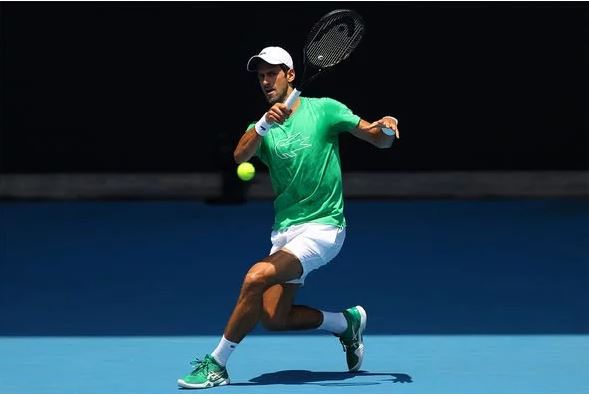
“It was very strange”: Novak Djokovic
Novak explained that something unusual was happening during the third set when his serve was broken twice. He suggested that he didn’t suffer from any injuries but all his energy was drained out.
“I didn’t have any injuries and it was very strange for me because I had done things pretty much the same as I always do. My energy completely collapsed. Every time I would toss a ball, I would feel dizzy,” Djokovic revealed in an interview with channel 9.
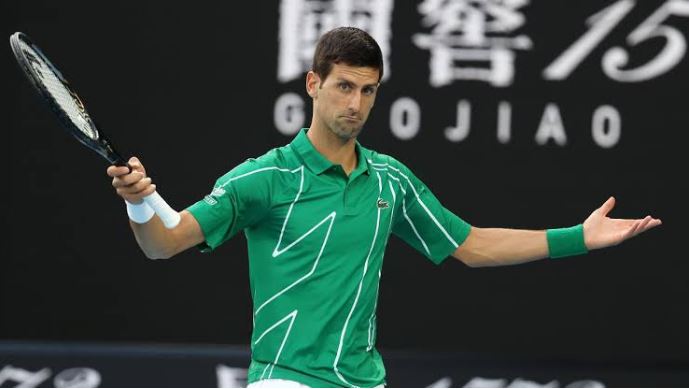
“We were trying to do everything possible within the circumstances to kind of find a way to rejuvenate. I was lucky with that serve and volley and coming back and I think from 2-all in the fourth, I started to feel better,” he added.
“I can’t really explain it”: Djokovic
Novak Djokovic also took a timeout during his 2020 Australian Open semifinal match against long-time rival Roger Federer on Thursday. Djokovic admitted that he was struggling with a similar type of trouble against the Swiss maestro.
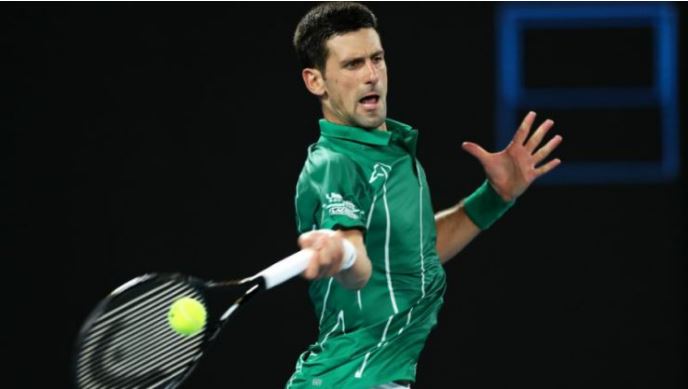
“It was a little bit similar. I can’t really explain it at the moment. I did talk to the doctor and she did assess and evaluate me when we walked off the court,” Novak said.
The Serbian divulged that the doctor told him that he has maybe a few conditions and things like that. However, it’s not much that he could do but get energy – gels and bars and lots of liquids. She told him that he was dehydrated and so he tried to drink it as much as he could.
After Eighth Australian Open Title, Djokovic Reflects On Root Of Mental Strength
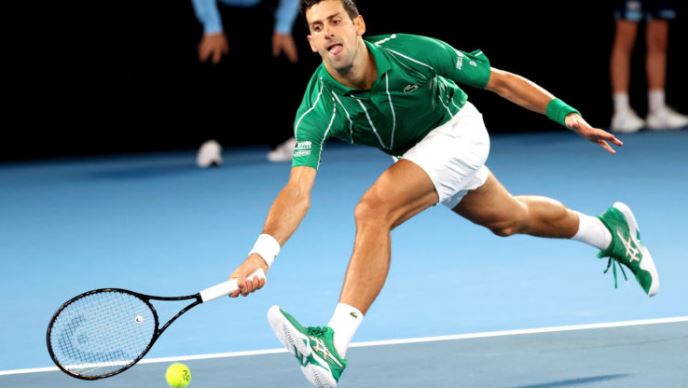
Seven times Novak Djokovic had trailed his opponent two sets to one in a Grand Slam final, and all seven times Djokovic had lost.
But on Sunday against Dominic Thiem, Djokovic rallied from that deficit for the first time to win his eighth Australian Open title and 17th major championship.
The 32-year-old Serbian moved to within two major titles of Rafael Nadal (19) and three of all-time leader Roger Federer (20). After the comeback win, Djokovic reflected on the root of his mental strength and what helped him achieve the career-first comeback.
“We all grew up in different circumstances, different countries, different upbringing. My upbringing was in Serbia during several wars during the ’90s, difficult time, an embargo in our country where we had to wait in line for bread, milk, water, some basic things in life. These kind of things make you stronger and hungrier for success I think in whatever you choose to do,” Djokovic said.
“That probably has been my foundation, the very fact that I came from literally nothing and difficult life circumstances together with my family and with my people. Going back to that, reminding myself where I came from always inspires me, motivates me to push even harder.
“That’s probably one of the reasons why I managed to find that extra gear, the mental strength to overcome challenges when they present themselves.”
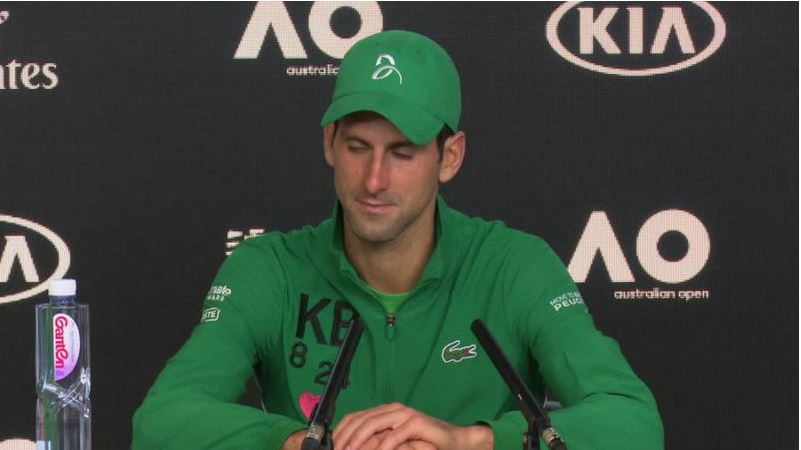
Djokovic has made a career of overcoming challenges, especially in the big moments. He is now 17-9 in Grand Slam finals and will begin his fifth stint — and 276th week — at No. 1 in the FedEx ATP Rankings on Monday.
If he maintains that place throughout 2020, Djokovic is projected to pass childhood idol Pete Sampras (286 weeks at No. 1) on 20 April and Federer (310 weeks) on 5 October to set a new all-time record for most weeks at No. 1.
“Grand Slams are one of the main reasons why I am still competing and still playing a full season, trying to obviously get the historic No. 1. That’s the other big goal. I put myself in this position that is really good at the moment. I’m super happy with the way I started the season. It kind of sets the tone for the rest of the year,” Djokovic said.
“I’ve had that privilege to win this big tournament for eight times. To start off the season with a Grand Slam win significantly boosts your confidence and your expectations are quite high for the rest of the season. But whatever happens, this season is already successful.”
It was a “turbulent” final, Djokovic said, one unlike any other he’s experienced because of the comeback but also because of his mid-match dip that Thiem seized upon to lead two sets to one.
“After I lost the second set, I start to feel really bad on the court. My energy dropped significantly. To be honest, I don’t still understand the reason why that has happened because I’ve been doing the things that I’ve been doing before all of my matches. I was hydrated well and everything. Apparently doctor said I wasn’t hydrated enough,” Djokovic said.
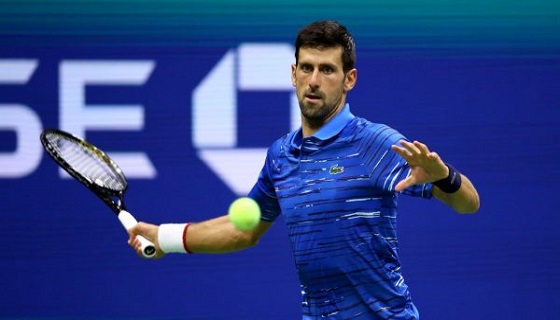
“[I] regained my energy and strength midway in the fourth set and got back into the match. I was on the brink of losing the match. Dominic is a fantastic tennis player that plays with tremendous amount of power in his shots, especially from the forehand side. He uses his slice really well. He disrupted my rhythm in my game at one point. He was a better player.”
But in the fourth and fifth sets, Djokovic relied on a rarely used but much improved part of his game – serving and volleying – to lead for good.
“Probably one point and one shot separated us tonight. Could have gone a different way. I served and volleyed when I was facing a break point in the fourth and in the fifth. It worked both of the times. It could have also been different. Serve and volley is not something I’m accustomed to. I’m not really doing that that often,” Djokovic said.
“I kind of recognised that as an important tactic in those circumstances, and I’m really happy it worked.”
Djokovic, Federer and Nadal have continued to evolve and improve throughout their historic careers. And, just as Federer and Nadal are thinking, Djokovic also has his mind set on even more improvement. After a bit of rest, one of the most mentally strong players in history will be eager to get back to the practice court and start to repeat the cycle: improve, win more trophies, improve, win more trophies.
“What I can do to still improve? There are many things on the tennis court that I can still improve. That excites me and motivates me to go day in, day out with my commitments, with my practice sessions, because there’s always something to work on, there are always more trophies to win,” Djokovic said.